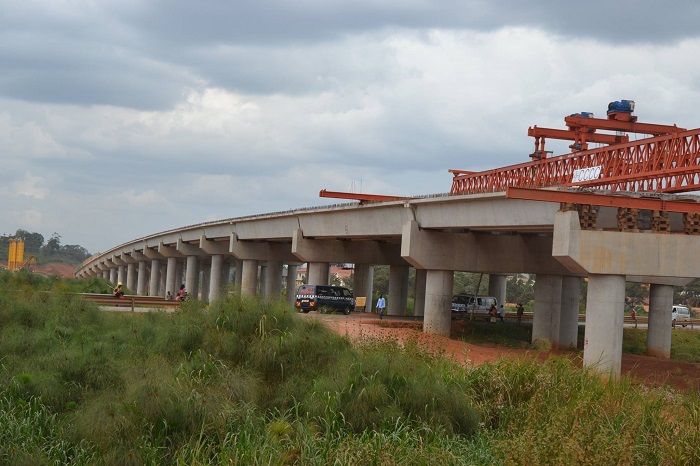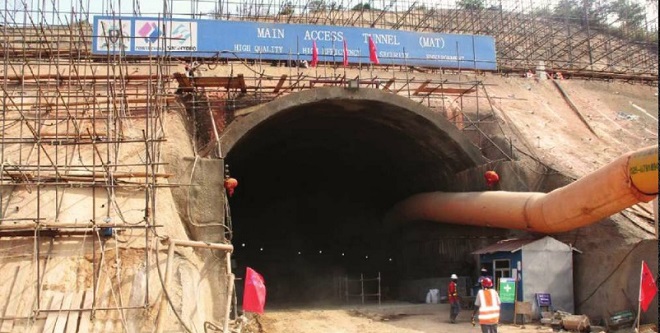

Local content fight: Manufacturers, Chinese face off over local materials as government sets up committee to salvage local manufacturing sector
On August 02, Matia Kasaija, the minister for finance, planning and economic development, chaired a high profile meeting at the ministry headquarters in Kampala. It comprised a delegation of officials from the Chinese Embassy, led by the Chinese Ambassador Zhao Yali. Also at the meeting were technocrats from the trade and works ministries, government agencies, chief executive officers of leading construction materials producers, the private sector.
Also present were top managers of the Chinese firms that are currently executing large-scale infrastructure projects. Michael Werikhe, the State minister for trade, Gideon Badagawa, the executive director at the Private Sector Foundation Uganda (PSFU), Abid Alam, the managing director Alam Group, also attended.
Top on the agenda was the issue of local content – how local firms can participate in the mega infrastructural projects currently being executed by the Chinese firms, given the concern that and all the raw materials were being imported from China – leaving local manufacturers incurring losses having invested colossal sums in preparation for supplying to the projects.
Consequently, some of the local manufacturers are in a total financial mess with the result that they need a government bailout to save them from their creditors.
For example, Alam Group’s Steel Rolling Mills is now facing receivership for failure to clear a debt of Shs50billion owed to Standard Chartered Bank. Alam, the proprietor, has squarely put the blame on the government’s door for failure to provide a market for his steel products at the mega projects.
The government is currently implementing a number of multi-billion infrastructural projects including Karuma, Isimba dams, Entebbe and Jinja Express Highways, expansion of Entebbe Airport, and the Standard Gauge Railway. All the projects are being implemented by Chinese companies, which are fighting off accusations of importing all the construction materials including steel and cement from China yet such materials are also manufactured locally.
The Chinese claim that the Ugandan products are of “low quality.” To make matters worse, the Chinese reportedly import more than they require for the projects and sell the rest on the open market thus completely edging the local manufacturers out of the market.
The Independent has learnt that during the meeting, a 10-member committee was formed consisting of officials from Uganda National Roads Authority (UNRA), Public Procurement Disposal of Public Assets (PPDA), the private sector, and finance ministry to dig into the issues that have hindered local manufacturers from participating in the government’s projects.
Headed by Kasaija, the committee is expected, within two weeks, to study contracts that government has signed with Chinese entities and analyse whether or not there’s a possibility to enforce local content.
In addition, the committee will also look into the issue of whether Uganda has sufficient laws and policies to enforce local content measures as well as make recommendations for both current and future contracts for purposes of safeguarding markets for the local manufacturing sector.
The Chinese claim that the Ugandan products are of “low quality.” To make matters worse, the Chinese reportedly import more than they require for the projects and sell the rest on the open market thus completely edging the local manufacturers out of the market.
Badagawa told The Independent on August 03 that the committee would also delve into the quality of the locally manufactured raw materials, prices, and the production capabilities.
Yali, the Chinese Ambassador, reportedly expressed interest in looking into the issue of local firms participating in contracts awarded to Chinese’s firms though with reservations over the “high prices” of locally produced raw materials.
Stuart Mwesigwa, the business development manager at the Roofings Rolling Mills, who also attended the meeting, intimated to The Independent that they vehemently refuted the claim by the Chinese and government officials that their products were ‘inferior’ saying their products have been tested and proved to be at international standards. Multiple sources who attended the meeting said the manufacturing sector also want the government’s accounting officers to offer priority to local companies in awarding tenders to ensure efficient manpower utilisation and enhancing forward and backward linkages.
This, however, is not the first time that the local manufacturers especially in the construction industry have engaged government on issues of local content.
Last May, Stanbic Bank organised an inaugural power and infrastructure symposium in Kampala, which brought together all the stakeholders in the construction industry to brainstorm on how the financial sectors can well participate in the industry.
This followed a series of other meetings in which local manufacturers always demanded a pie of the government’s mega infrastructural project to boost their business as a result of the ready market.
During the symposium, PPDA Executive Director Cornelia Sabiiti revealed that almost 90% of the big contracts in the country are being handled by foreign companies from developed economies, mainly China, thus limiting skills transfer and unemployment.
She blamed it on lack of a regulatory framework that requires local firms to perform a certain percentage of work in a specific multibillion project.
Local contractors and consultants, according to PPDA rules, are those registered within the country, with a 51% of shareholding held by citizens.
Badagawa said there’s a need to take the cue from Kenya where foreign contractors reserve a percentage (30%) of their projects to the local firms.
Uganda is still dillydallying to pass the local content strategy.
***
editor@independent.co.ug
 The Independent Uganda: You get the Truth we Pay the Price
The Independent Uganda: You get the Truth we Pay the Price



